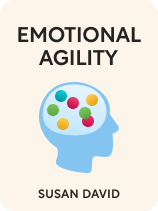

This article is an excerpt from the Shortform book guide to "Emotional Agility" by Susan David. Shortform has the world's best summaries and analyses of books you should be reading.
Like this article? Sign up for a free trial here.
Do you ignore emotional pain? Do you wallow in it?
Susan David explains that we all have narratives in our minds that make us feel certain ways. Sometimes, they cause pain. She discusses two unhealthy responses to these controlling narratives: bottling emotions and brooding over emotions.
Keep reading to understand these two ways of dealing with emotional pain and why they only cause more trouble.
Dealing With Emotional Pain
Your brain often makes mistakes when interpreting meaning from sensory information—and, because it relies on these faulty interpretations to form narratives, the narratives it creates don’t always reflect objective reality.
Narratives deliver information through an internal stream of consciousness that constantly fills your mind with thoughts, associated memories, and emotions. When you reflect on these thoughts, this inner voice also drives you to judge yourself through the lens of your narratives. David says these self-judgments create emotions of inadequacy and frustration.
When you feel negative emotions about an event, past or present, you may be tempted to use one of two common—but unhelpful—methods of dealing with emotional pain: bottling and brooding. We’ll explore each method and explain David’s reasoning for why both methods fail.
#1: Bottling Emotions
Bottlers attempt to avoid feeling or acknowledging negative emotions that arise from their narratives. They believe only weak people are affected by emotions and choose to reject them. David explains that you can ignore your emotions temporarily, but they’ll grow stronger as you push them away—until they eventually explode. For example, after many months of bottling hurt at your spouse’s tendency to forget important events, you unexpectedly blow up at them for forgetting to pick up garlic at the store as you asked.
Moreover, Bottlers miss out on the ways emotions can be valuable. Remember that your emotions not only help you avoid danger, but they can also allow you to thrive. For example, working a dead-end job might frustrate you because you believe the narrative that you deserve more fulfilling work. Bottling that frustration so that you don’t feel daily discomfort can also leave you unmotivated to find something better.
#2: Brooding Over Emotions
Brooders ruminate on their narratives and negative emotions rather than bottling them. They often fixate on past negative experiences, repeatedly reliving the emotions associated with those events. These emotions and experiences can range from traumatic (hating a drunk driver who caused your long-term injury) to annoying (complaining to your spouse about a coworker’s irritating habit). David says that those who brood in one area likely do so in many other areas of life, using brooding as a general approach to handling negative emotions.
David says that Brooders often believe they’re working through their emotions in a healthy way by thinking about them over and over. However, the strategy of brooding never moves past an eternal loop of “think about it some more,” which only intensifies the negative emotions and takes up mental space you could otherwise use to improve your life. Without a way to move on from painful emotions, merely thinking about them can’t free you from them.
| Other Motivations for Brooding Although David describes brooding as a strategy people use to try and work through their emotions about an event, research shows that the reasons for brooding may be a bit more nuanced. First, in some cases, people aren’t purposely ruminating on past experiences. People with Post-Traumatic Stress Disorder (PTSD) do revisit traumatic events and emotions from the past, but they do so involuntarily. ACT’s focus on accepting your emotions can help alleviate these symptoms—suggesting that ACT is helpful whether or not your brooding is deliberate. Second, research shows that not everyone broods because they think doing so will help them work through their emotions. Instead, some choose this strategy because they’re not sure how to feel about an event. Others brood over emotions that aren’t clearly attached to an event in an effort to understand what caused them. |

———End of Preview———
Like what you just read? Read the rest of the world's best book summary and analysis of Susan David's "Emotional Agility" at Shortform.
Here's what you'll find in our full Emotional Agility summary:
- Why most people react instinctively rather than objectively
- How to live according to your values to create the life you want
- How to handle your emotions better using mindfulness techniques






